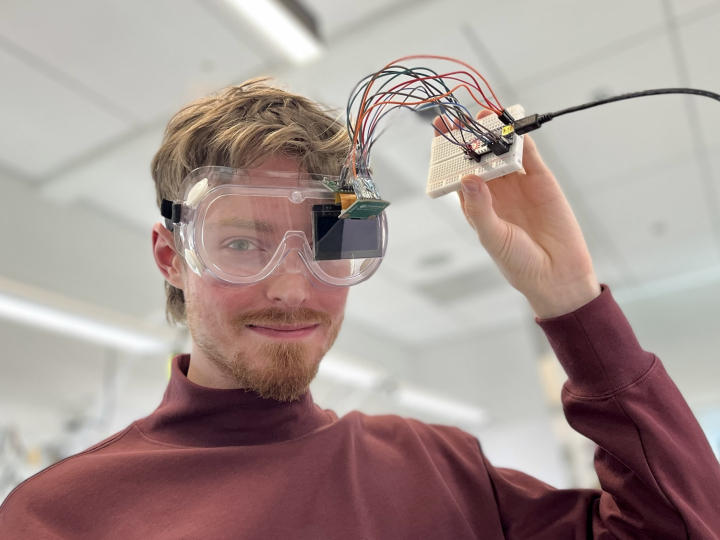CS Ph.D. Student Logan Stevens Awarded NSF Graduate Research Fellowship
Logan Stevens, a Ph.D. student in the University of Maryland’s Department of Computer Science, has received a National Science Foundation (NSF) Graduate Research Fellowship. He is one of a select group of graduate students nationwide awarded this year as part of the 2025 cohort.
The NSF Graduate Research Fellowship Program (GRFP) provides three years of support over a five-year period to students pursuing full-time research-based master’s and doctoral degrees in science, technology, engineering and mathematics (STEM) or STEM education. The program is intended to help ensure the vitality of the U.S. scientific and engineering workforce.
Stevens is advised by Assistant Professor Jun Nishida and conducts research in the intersection of extended reality (XR), human-computer interaction, human augmentation and cognitive enhancement. His work examines how visual, tactile and auditory stimuli, whether consciously perceived or not, affect cognition and learning.
He is particularly interested in how technologies such as XR, diminished reality (DR) and wearable devices can be used to apply those insights in practice. Stevens is a member of the university’s Embodied Dynamics Laboratory (EmD Lab), where he collaborates on projects that explore the relationship between sensory input and cognitive function.
“The fellowship was quite competitive this year, so this stands as a significant endorsement of my research and a momentous landmark in my career,” Stevens said. “I am incredibly grateful to my advisor and many previous mentors for their guidance, patience, and encouragement. It is inspiring that the NSF sees value in this budding research area, and I am thankful for its generous support as I continue my graduate studies.”
Stevens said his goal is to develop technology that enhances learning outcomes and supports cognitive abilities.
“Ideally, my work will result in ubiquitous and accessible technology that contributes to better learning outcomes,” he said. “I have always seen the potential for technology to directly enhance learning and other abilities. However, for this to be effective, understanding the human element is crucial, and blindly forcing technology into learning environments can have drastically detrimental effects.”
His approach combines cognitive science, neuroscience and pedagogy with computing to design interventions that are both technologically feasible and rooted in how people learn and think.
Looking ahead, Stevens plans to continue developing tools that are unobtrusive and adaptable, with a focus on cognition, education and well-being. He and other EmD Lab researchers are currently working on a hardware project and brainstorming ideas for future research directions.
—Story by Samuel Malede Zewdu, CS Communications
The Department welcomes comments, suggestions and corrections. Send email to editor [-at-] cs [dot] umd [dot] edu.
